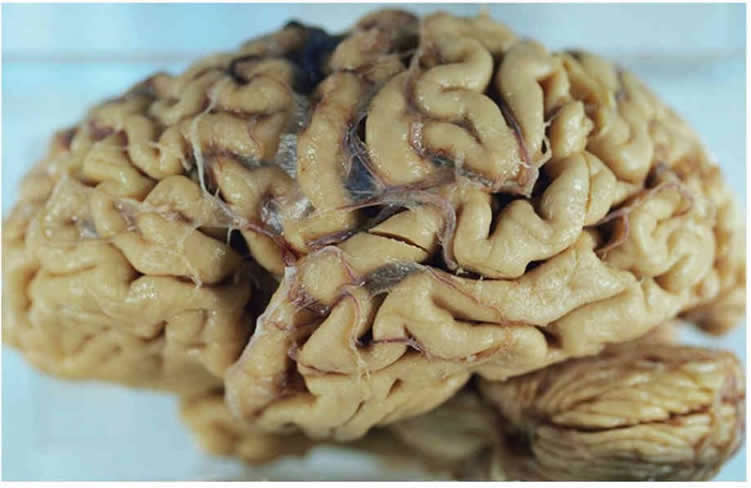Summary: Researchers suggest a mutation of the PSEN1 gene could trigger early onset Alzheimer’s disease.
Source: University of Adelaide.
A University of Adelaide analysis of genetic mutations which cause early-onset Alzheimer’s disease suggests a new focus for research into the causes of the disease.
Previous research has revolved around the idea that accumulation in the brain of a small, sticky protein fragment — amyloid beta — causes Alzheimer’s disease.
However, there is growing concern among researchers that this idea is not rapidly advancing global understanding of the disease or leading to successful treatments.
The University of Adelaide scientists, in collaboration with researchers from a number of other Australian universities, say their analysis points to a new theory about how mutations of a particular gene, PSEN1, can trigger early onset Alzheimer’s disease.
“Most of the mutations that cause Alzheimer’s disease before retirement age are found in the PSEN1 gene,” says study leader, Associate Professor Michael Lardelli, School of Biological Sciences. “Fortunately, this early onset form of Alzheimer’s disease accounts for only about 1% of all disease cases. Nevertheless, a huge research effort has focused on these mutations in the hope that advanced genetics analysis techniques might shed light on the still mysterious origins of both early and late onset Alzheimer’s disease.”
Published in the Journal of Alzheimer’s Disease, the researchers examined past research on PSEN1 and noted a particular correlation between the types of mutations affecting this gene and whether or not they caused Alzheimer’s disease.
“The protein normally produced by the PSEN1 gene is remarkable since it plays so many different roles in cells,” says Associate Professor Lardelli. “Almost everyone has been looking at how mutated PSEN1 protein affects production of amyloid beta. However, we think a broader, more holistic view of the mutation data not focused on amyloid beta may be telling a different story.”
“There are two pathways that PSEN1 protein can take when it functions in cells. One pathway leads to production of amyloid beta while the second, less-studied pathway controls many other important activities including how cells recycle their components and respond to restricted oxygen availability.

“We suggest that changes in this second pathway are better correlated with how mutations affect the structure of PSEN1 protein and the other proteins it interacts with. By taking our focus away from amyloid beta the mutation data seem to make more sense.”
“An exciting possibility is that the fundamentals of our idea may be extended to understanding the much more common late onset form of Alzheimer’s disease. That is something we are currently investigating with our animal models of the disease,” says Associate Professor Lardelli.
Source: Michael Lardelli – University of Adelaide
Image Source: This NeuroscienceNews.com image is in the public domain.
Original Research: Full open access research for “Evidence For and Against a Pathogenic Role of Reduced γ-Secretase Activity in Familial Alzheimer’s Disease” by Jayne, Tanya; Newman, Morgan; Verdile, Giuseppe; Sutherland, Greg; Münch, Gerald; Musgrave, Ian; Moussavi Nik, Seyyed Hani; and Lardelli, Michael in Journal of Alzheimer’s Disease. Published online May 23 2016 doi:10.3233/JAD-151186
[cbtabs][cbtab title=”MLA”]University of Adelaide. “Alzheimer’s Genetics Points to New Research Direction.” NeuroscienceNews. NeuroscienceNews, 27 June 2016.
<https://neurosciencenews.com/genetics-alzheimers-neurology-4574/>.[/cbtab][cbtab title=”APA”]University of Adelaide. (2016, June 27). Alzheimer’s Genetics Points to New Research Direction. NeuroscienceNews. Retrieved June 27, 2016 from https://neurosciencenews.com/genetics-alzheimers-neurology-4574/[/cbtab][cbtab title=”Chicago”]University of Adelaide. “Alzheimer’s Genetics Points to New Research Direction.” https://neurosciencenews.com/genetics-alzheimers-neurology-4574/ (accessed June 27, 2016).[/cbtab][/cbtabs]
Abstract
Evidence For and Against a Pathogenic Role of Reduced γ-Secretase Activity in Familial Alzheimer’s Disease
The majority of mutations causing familial Alzheimer’s disease (fAD) have been found in the gene PRESENILIN1 (PSEN1) with additional mutations in the related gene PRESENILIN2 (PSEN2). The best characterized function of PRESENILIN (PSEN) proteins is in γ-secretase enzyme activity. One substrate of γ-secretase is encoded by the gene AMYLOID BETA A4 PRECURSOR PROTEIN (AβPP/APP) that is a fAD mutation locus. AβPP is the source of the amyloid-β (Aβ) peptide enriched in the brains of people with fAD or the more common, late onset, sporadic form of AD, sAD. These observations have resulted in a focus on γ-secretase activity and Aβ as we attempt to understand the molecular basis of AD pathology. In this paper we briefly review some of the history of research on γ-secretase in AD. We then discuss the main ideas regarding the role of γ-secretase and the PSEN genes in this disease. We examine the significance of the “fAD mutation reading frame preservation rule” that applies to PSEN1 and PSEN2 (and AβPP) and look at alternative roles for AβPP and Aβ in fAD. We present a case for an alternative interpretation of published data on the role of γ-secretase activity and fAD-associated mutations in AD pathology. Evidence supports a “PSEN holoprotein multimer hypothesis” where PSEN fAD mutations generate mutant PSEN holoproteins that multimerize with wild type holoprotein and dominantly interfere with an AD-critical function(s) such as autophagy or secretion of Aβ. Holoprotein multimerization may be required for the endoproteolysis that activates PSENs’ γ-secretase activity.
“Evidence For and Against a Pathogenic Role of Reduced γ-Secretase Activity in Familial Alzheimer’s Disease” by Jayne, Tanya; Newman, Morgan; Verdile, Giuseppe; Sutherland, Greg; Münch, Gerald; Musgrave, Ian; Moussavi Nik, Seyyed Hani; and Lardelli, Michael in Journal of Alzheimer’s Disease. Published online May 23 2016 doi:10.3233/JAD-151186






